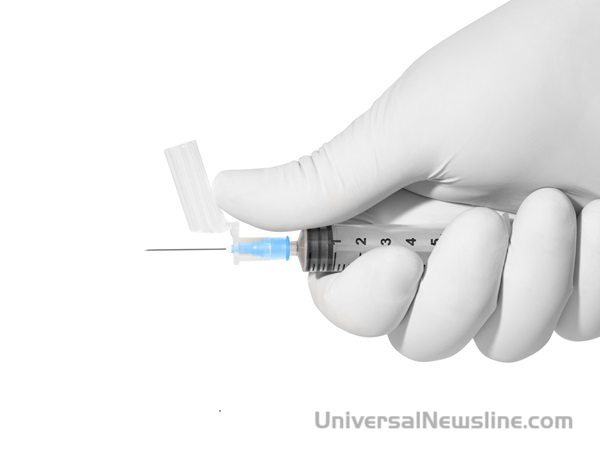 |
| Dispojekt Safety Needle now made in India |
Yet another efforts towards Atmanirbhar Bharat with the launch of first-of-its kind Dispojekt single use syringes with safety needle that is developed by Hindustan Syringes and Medical Devices (HMD) that is nearly half the cost of safety single use syringes used in the USA and Europe.
The launch aligns with India's efforts to become a self-reliant hub for medical device manufacturing and exporting. Dispojekt is expected to bring about a positive financial impact on the healthcare sector by reducing healthcare worker injuries and associated costs.
With the revolutionary Dispojekt safety syringes, HMD aims to reduce prevalence of accidental Needle Stick Injuries (NSIs) among health workers, reduction of infection control cost and that of disposal and training, offering a long term positive financial impact on the healthcare sector. Domestic manufactured, technologically advanced products will provide India a global edge in the realm of R&D and leapfrog indigenous players to meet the highly demanding global market for sharp injury prevention syringes.
The use of safety needles in healthcare settings offer numerous cost benefits. They reduce healthcare worker injuries, lowering costs from potential disease treatment and potential long-term health issues. By minimizing needle stick injuries, they also decrease expenses for post-exposure prophylaxis and associated healthcare costs. Moreover, safety needles mitigate compensation claims, absenteeism, and can lead to lower health insurance premiums, while also reducing product and packaging footprints for cost and environmental savings. They assist in creating a safer and more reliable workplace environment for healthcare workers.
“Equipped with a safety shield (SIP Shield), Dispojekt syringe addresses critical concerns of needle stick injuries and reaffirms our commitment as market leader towards excellence in healthcare. It is a great outcome of our Make in India resolve as envisioned by Prime Minister Narendra Modi to realize the goal of Viksit Bharat,” said Rajiv Nath, Managing Director, HMD, adding that India is all poised to become a global powerhouse in manufacturing and exporting of medical devices in sync with the spirit of Atma Nirbhar Bharat.
There is significant headroom for innovation and growth in the medical devices industry and the future of healthcare technology rests on robust R&D. With the disposable syringe market size in India estimated to be over 5 billion units per year and 5-6 billion needles, 80 % of which are in the hands of private sector players. “We aim for 60-70 % market share in the next three years, thanks to our innovative Dispojekt,” informed the Executive Director, Sohail Nath.
“HMD believes in delivering the best at the most competitive costing. Dispojekt safety needle syringes are going to be the game changer in the Global fight against NSIs. We are aiming to initially produce 200 million syringes and needles per annum for which we have invested approximately Rs 70 cr in the first phase which is expected to increase to 300 million pieces annually in second phase,” revealed Mr Sohail.
As one of the most reputed medical device manufacturers with multiple state-of-the-art manufacturing facilities in Faridabad, Haryana, HMD produces over 4 billion injection needles per annum, catering to the needs of its primary markets comprising India, Europe, US, Middle East, and its secondary markets of South-East Asia and Africa.
Reflecting further, he said that Dispojekt safety needle syringes will not only further strengthen our position as market leader but will give a boost global collective efforts of WHO to check NSIs leading to transmission of blood borne disease, like Hepatitis B, C and HIV among healthcare personnel, betting on its quality, uniqueness and affordability.
“Dispojekt safety needle syringes have been designed to be affordable for the developing world including India and are nearly half the cost of safety single use syringes used in the USA and Europe where 100 percent usage is mandatory by legislation,” informed Sohail Nath.
According to research, the prevalence of NSIs among healthcare workers in India is between 57% and 73%. In fact, approximately 54% of NSIs are reported because of using hypodermic needles. Many instances of NSIs go unreported, making it a way more serious problem than it appears. To shield frontline healthcare workers from the dangers of NSIs, we at HMD have pioneered a single-use syringe with safety needle –Dispojekt.
The Center for Disease Control and Prevention, US, has estimated that only 10 % of NSIs injuries are reported. In developing countries, which have the highest global prevalence of HIV, the prevalence of needle stick injuries is also at the highest level. Studies report an annual of 100,000 injuries caused by sharp objects among nurses in the UK as well.
Asked about clinical studies conducted to affirm safety and efficacy of Dispojekt safety needle syringes, Rajiv Nath said, “Dispojekt syringes are a part of Safety Engineered Devices (SED). Numerous clinical studies and evaluations have been conducted to assess the safety and efficacy of syringes with safety needles. There are clinical trials which have proved that the use of SED has reduced the incidence of needle stick injuries in healthcare workers” and its usage is encouraged as best practices for Injection Safety in EU & USA and by WHO in the developing world. This initial design was field trialed in India, UK and USA and based on feedback received the product was re-engineered to be more cost effective and affordable and user friendly, by being a major improvement over existing commonly available safety syringes in the global market.
The launch of Dispojekt safety needle syringes, an innovative and cost-effective product from the R&D lab of the world’s largest manufacturer of Auto-Disable (AD) syringes, assumes significance in view of the monstrous magnitude of NSIs among the health workers.

No comments:
Post a Comment